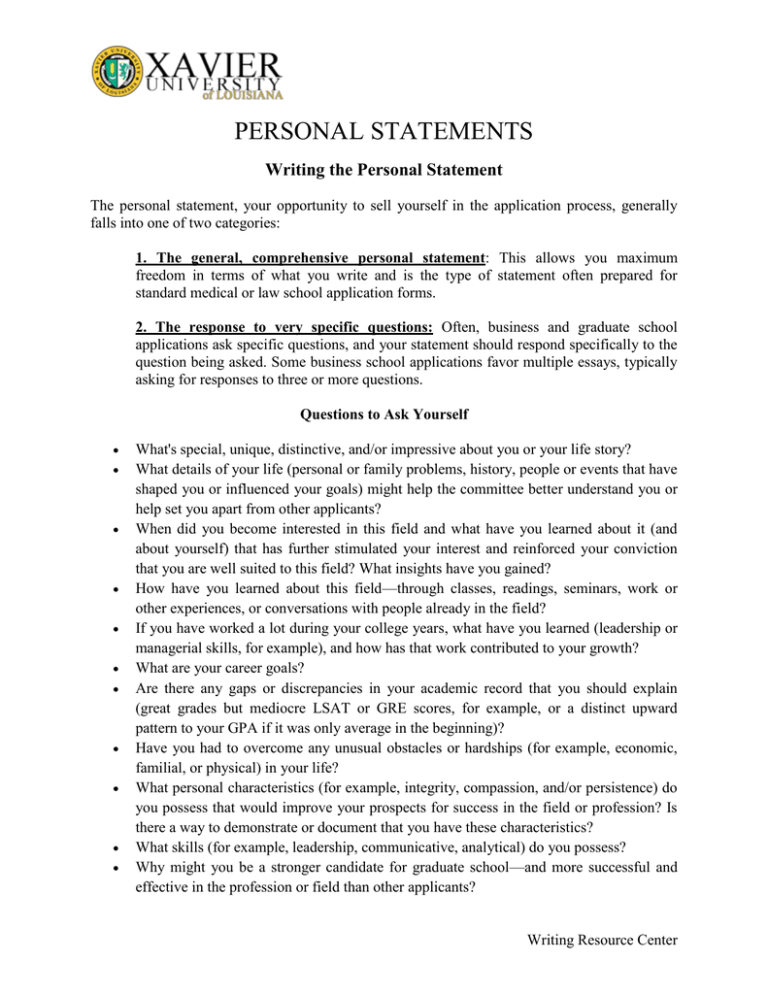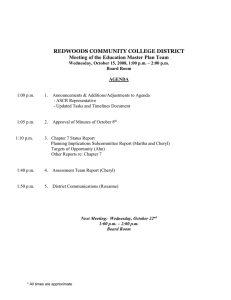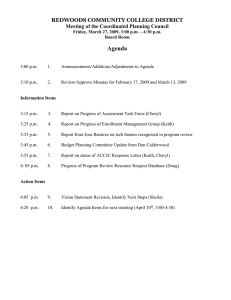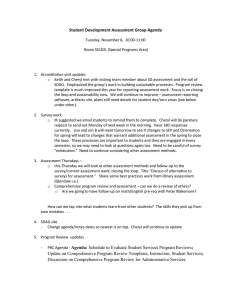PERSONAL STATEMENTS Writing the Personal Statement
advertisement

PERSONAL STATEMENTS Writing the Personal Statement The personal statement, your opportunity to sell yourself in the application process, generally falls into one of two categories: 1. The general, comprehensive personal statement: This allows you maximum freedom in terms of what you write and is the type of statement often prepared for standard medical or law school application forms. 2. The response to very specific questions: Often, business and graduate school applications ask specific questions, and your statement should respond specifically to the question being asked. Some business school applications favor multiple essays, typically asking for responses to three or more questions. Questions to Ask Yourself What's special, unique, distinctive, and/or impressive about you or your life story? What details of your life (personal or family problems, history, people or events that have shaped you or influenced your goals) might help the committee better understand you or help set you apart from other applicants? When did you become interested in this field and what have you learned about it (and about yourself) that has further stimulated your interest and reinforced your conviction that you are well suited to this field? What insights have you gained? How have you learned about this field—through classes, readings, seminars, work or other experiences, or conversations with people already in the field? If you have worked a lot during your college years, what have you learned (leadership or managerial skills, for example), and how has that work contributed to your growth? What are your career goals? Are there any gaps or discrepancies in your academic record that you should explain (great grades but mediocre LSAT or GRE scores, for example, or a distinct upward pattern to your GPA if it was only average in the beginning)? Have you had to overcome any unusual obstacles or hardships (for example, economic, familial, or physical) in your life? What personal characteristics (for example, integrity, compassion, and/or persistence) do you possess that would improve your prospects for success in the field or profession? Is there a way to demonstrate or document that you have these characteristics? What skills (for example, leadership, communicative, analytical) do you possess? Why might you be a stronger candidate for graduate school—and more successful and effective in the profession or field than other applicants? Writing Resource Center PERSONAL STATEMENTS What are the most compelling reasons you can give for the admissions committee to be interested in you? General Advice Answer the questions that are asked If you are applying to several schools, you may find questions in each application that are somewhat similar. Don't be tempted to use the same statement for all applications. It is important to answer each question being asked, and if slightly different answers are needed, you should write separate statements. In every case, be sure your answer fits the question being asked. Tell a story Think in terms of showing or demonstrating through concrete experience. One of the worst things you can do is to bore the admissions committee. If your statement is fresh, lively, and different, you'll be putting yourself ahead of the pack. If you distinguish yourself through your story, you will make yourself memorable. Be specific Don't, for example, state that you would make an excellent doctor unless you can back it up with specific reasons. Your desire to become a lawyer, engineer, or whatever should be logical, the result of specific experience that is described in your statement. Your application should emerge as the logical conclusion to your story. Find an angle If you're like most people, your life story lacks drama, so figuring out a way to make it interesting becomes the big challenge. Finding an angle or a "hook" is vital. Concentrate on your opening paragraph The lead or opening paragraph is generally the most important. It is here that you grab the reader's attention or lose it. This paragraph becomes the framework for the rest of the statement. Tell what you know The middle section of your essay might detail your interest and experience in your particular field, as well as some of your knowledge of the field. Too many people Writing Resource Center PERSONAL STATEMENTS graduate with little or no knowledge of the nuts and bolts of the profession or field they hope to enter. Be as specific as you can in relating what you know about the field and use the language professionals use in conveying this information. Refer to experiences (work, research, etc.), classes, conversations with people in the field, books you've read, seminars you've attended, or any other source of specific information about the career you want and why you're suited to it. Since you will have to select what you include in your statement, the choices you make are often an indication of your judgment. Don't include some subjects There are certain things best left out of personal statements. For example, references to experiences or accomplishments in high school or earlier are generally not a good idea. Don't mention potentially controversial subjects (for example, controversial religious or political issues). Do some research, if needed If a school wants to know why you're applying to it rather than another school, do some research to find out what sets your choice apart from other universities or programs. If the school setting would provide an important geographical or cultural change for you, this might be a factor to mention. Write well and correctly Be meticulous. Type and proofread your essay very carefully. Many admissions officers say that good written skills and command of correct use of language are important to them as they read these statements. Express yourself clearly and concisely. Adhere to stated word limits. Avoid clichés A medical school applicant who writes that he is good at science and wants to help other people is not exactly expressing an original thought. Stay away from often-repeated or tired statements. Writing Resource Center PERSONAL STATEMENTS GOOD EXAMPLE I could hardly keep myself from staring at the girl: the right side of her face was misshapen and bigger than the left. Only later did I notice that Cheryl, about nine at the time, had light brown hair, lively brown eyes, and a captivating smile. When she walked into the candy shop where I worked six years ago, Cheryl told me she was a student of my former fourth grade teacher with whom I had kept in contact. We talked then and spent time talking each time she visited. She became a very special friend of mine, one whom I admire greatly. At the time we met, I was taking honors and AP classes, working about twenty hours a week, and feeling sorry for myself. Cheryl's outgoing confidence and good cheer put my situation in perspective. Cheryl was strong, kind, and surprisingly hopeful. She never focused on her facial deformities, but always on the anticipated improvement in her appearance. Her ability to find strength within herself inspired me to become a stronger person. It motivated me to pursue a career where I could help those like Cheryl attain the strength that she possesses. At the time, my initial interest turned toward psychology. Impressed with Cheryl's outlook, I overlooked the source of her strength: she knew that treatment will improve her appearance. Focusing on the emotional aspects of her illness, I volunteered at the Neuropsychiatric Institute. There, I supervised the daily activities of pre-adolescents, played with them, and assisted them in getting dressed. I worked with crack babies, autistic children, and children who had severe behavioral problems. I enjoyed interacting with the children, but I often became frustrated that I was not able to help them. For instance, a young autistic boy frequently hit himself. No one was permitted to stop this child. We had to turn away and allow him to continually strike and hurt himself until he tired. I was increasingly disappointed with the lack of progress I saw in my volunteer work at NPI, but my job again pushed me in the right direction. During the fall quarter of my junior year in college, I left the candy shop where I had worked for nearly five and a half years, and I began working as a senior clerk in the Anesthesiology Residency Program. Ironically work, which frequently made study difficult, helped me find the right path. There I learned about the oral and maxillo-facial specialty, which will allow me to help people like Cheryl. To explore my interest in dentistry, I volunteered as a dental assistant in Dr. Miller's dental office. Dr. Miller introduced me to various dental techniques. Although I was mainly an observer, I had the opportunity to interact with the patients. I came in contact with a diverse patient population with different problems and dental needs. I observed as Dr. Miller dealt with each patient individually and treated each one to the best of his ability. He familiarized me with strategies for oral health promotion and disease prevention. I learned a great deal from him, and as a result, my interest in dentistry grew. Writing Resource Center PERSONAL STATEMENTS I choose to pursue a career in dentistry after following a circuitous path. My friendship with Cheryl motivated me to enter a field where I can help the severely disfigured cope with their condition. Although I initially turned to psychology, I found my work at the Neuropsychiatric Institute to be frustrating and was searching for a different way to achieve my goal. Ironically, Cheryl had told me all along the source of her strength: the knowledge that her condition was treatable and improving. Through maxillo-facial dentistry I will help others with serious facial deformities have the same knowledge and source of strength. Writing Resource Center PERSONAL STATEMENTS BAD EXAMPLE I want to make my personal statement for enrollment in your college program for Special Education something different. I think the best way to do this is very clear. It does pay to be open and honest at all times. Especially being honest and open with you on all fronts too. Why do I want to be a student in your individual teaching program of education a whole lot? Well, I’m going to give you the best answer I can, which does come straight from my heart and soul. I love to teach, and I learned this at a very early age. At the young age of only five, I was playing teacher in my bedroom, and my dolls and stuffed toys were my only students. Also, when Grammy Emma would visit, she would also lovingly be one of my students too. Everyone in the family knew then that I would be a teacher someday. This is why I am now applying for educational instruction in your special education program. I have just always loved to learn. Going to school for me was a real adventure. Every discovery, I did make via training, was something that I added to my own personal collection of learning as I grew up from child to adult. I think the desire to teach was something that started very early on, when I was in kindergarten. It began the moment, I learned how to interact with other kids of my age, and then developed a real love for wanting to learn. School proved to be a very fun place for me in every way. I just loved being in the classroom. I was very unlike other children, some of whom didn’t like school, all that much. It seems that I was born to be in a classroom, don’t ask me why. Maybe all of these things were a clear indication that I was meant to be a teacher someday. Why do I want to teach special students the most? Well, the answer is very clear on this, and it is because special students need that little special touch when it comes to learning. I have the patience, the willingness, as well as a great love to want to teach these very exceptional students. This is because they do need the most caring of all instruction possible, and I can do that kind of teaching the best because it will be coming from my heart. Exceptional students are indeed outstanding in every way. They need all of understanding, as well as the most caring of all instruction, which a dedicated and devoted teacher can give them. I want to be that very special teacher, to these so very needing students, in all the ways that count the most. Teaching special children requires a different kind of instructor. I think that I can be that very kind of teacher if given the chance. So, please do consider what I have said here, and do approve my application for continued learning in your unique program of study for those who desire to be teachers. Writing Resource Center


